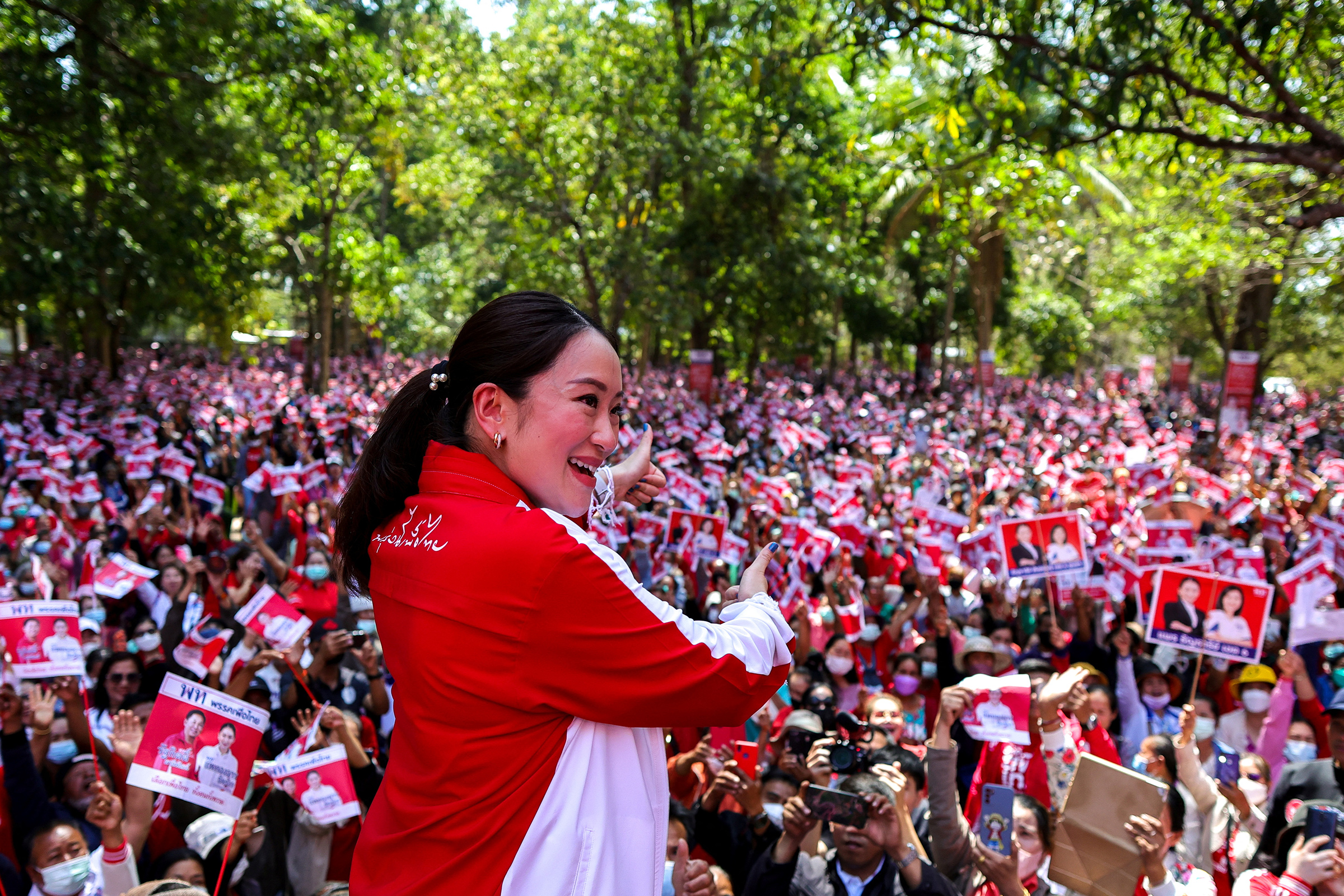The sun has just dipped from its blistering peak as Paetongtarn Shinawatra’s SUV rolls up at Wat Tha Luang, an ornate temple perched on the banks of central Thailand’s Nan River. Even before her designer sneakers touch the sticky asphalt, the 36-year-old is lost amid a sea of supporters, brandishing marigold garlands and demanding selfies.
Paetongtarn, the frontrunner in Thailand’s May 14 general elections, greets all with warm smiles as she enters the temple’s ubosot ordination hall, where she bows deeply to the golden Buddha statue before receiving a sprinkling of blessed water from a saffron-robed monk. It’s an obligatory stop before a campaign rally at a technical college in the nearby town of Phitchit, where 20,000 supporters of Paetongtarn’s Pheu Thai party are sprawled on the parched earth, feasting on grilled meat skewers and papaya salad as Thai folk music blares. The event’s huge speakers are soon drowned out by riotous cheering as Paetongtarn climbs the stage, striding to and fro as she whips up the flag-waving masses into a frenzy.
“Phichit has great potential,” she tells the crowd. “It grows fragrant rice but the people are still in debt. I am ready to solve Thailand’s problems for brothers and sisters of all ages, all professions. Any piece of state land that is not being used we will distribute equally to the people.”
If those people have their way, Paetongtarn, who goes by the nickname “Ing,” will be their new leader. Opinion surveys give Pheu Thai a commanding and growing lead, and victory at the ballot box should propel Paetongtarn to become Asia’s youngest-ever female leader—despite only entering politics a year ago. Not only that, she is eight months pregnant with her second child and due to give birth right before the polls. “I just wish that I don’t give birth on election day,” she tells TIME in her first interview with a U.S. outlet. “Mentally, I don’t feel that campaigning is tiring at all. It’s challenging [but] I think it’s fun.”
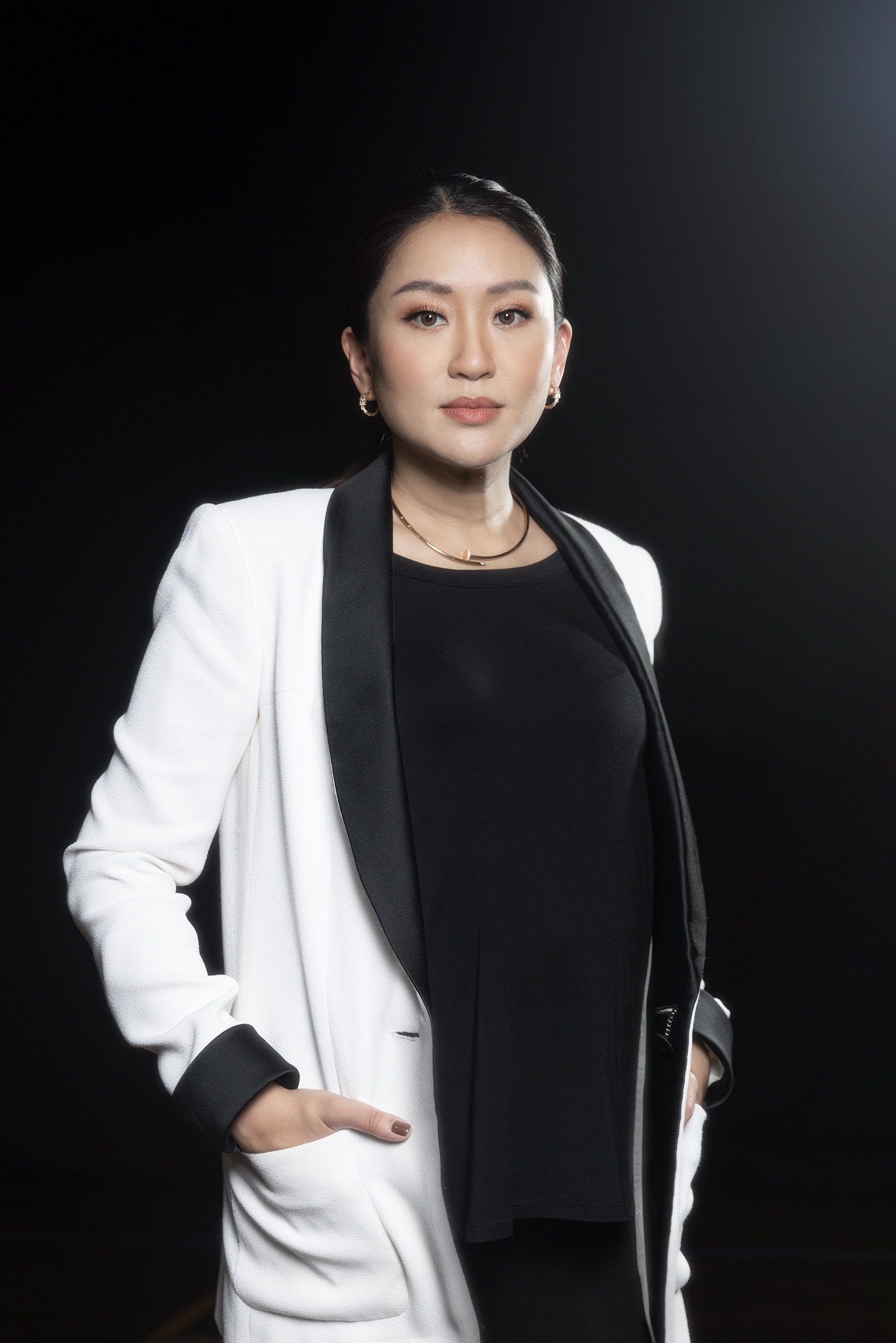
Yet the stakes are undoubtedly high. Thailand is America’s oldest ally in Asia and has traditionally been a democratic beacon amid more authoritarian neighbors. Its backsliding is problematic for U.S. interests as its military establishment leans closer to rival superpower China. May’s election will go a long way to decide whether that trajectory is entrenched or reversed. “We need to try to make the country more democratic,” says Paetongtarn.
Paetongtarn’s meteoric rise is, on some level, unsurprising. She is the youngest daughter of Thaksin Shinawatra, a policeman turned billionaire media mogul who was first elected Thai prime minister in 2001, only to be toppled five years later in a coup d’état. He was subsequently convicted in absentia of corruption—charges he denies—and now lives in exile, mainly in Dubai. But the political awakening he sparked refuses to die. Thaksin’s populist machine, which relied on courting rural voters, is loathed by Thailand’s Bangkok-based establishment. Parties he backs have won every election since his ouster only to be removed by military or judicial interventions. Most recently, a government headed by Thaksin’s sister, Yingluck Shinawatra, was overthrown by the military in 2014. (She now also lives overseas following a corruption conviction she insists is politically motivated).
More from TIME
In a bid to muzzle Thaksin’s influence for good, the generals rewrote the nation’s constitution in 2016 to include a 250-strong military-appointed senate as well as the 500-seat elected parliament, with the two combined chambers charged with choosing the nation’s leader. It’s for this reason that General Prayuth Chan-ocha—who led the 2014 ouster of Paetongtarn’s aunt—managed to stay on as prime minister by cobbling together a royalist coalition following elections in 2019. It’s a patently rigged system that “I can’t really call democracy,” says Paetongtarn, who was named head of the “Pheu Thai Family” in March 2022. “Because [the 250 senators] are not from the people.”
Paetongtarn says Pheu Thai’s aim is to win 310 seats, believing this overwhelming majority will make it impossible for the military to ignore the people’s mandate and shut them out of power. For sure, nobody expects anything but a Pheu Thai landslide—the only question is how big the party’s winning margin will be. “I think it could be up to 100 MPs,” says Thitinan Pongsudhirak, professor of political science at Chulalongkorn University in Bangkok. “A lot of votes will not just be for Pheu Thai, but also to see the back of Prayuth.”
But whether Paetongtarn is allowed to form a government is another question entirely, with her family history showing that she’s more likely to end up banished than installed in Bangkok’s Government House. Still, Paetongtarn is facing the situation head-on. “I’m not scared,” she says. “The people don’t agree with the coup anymore. Thailand needs change.”
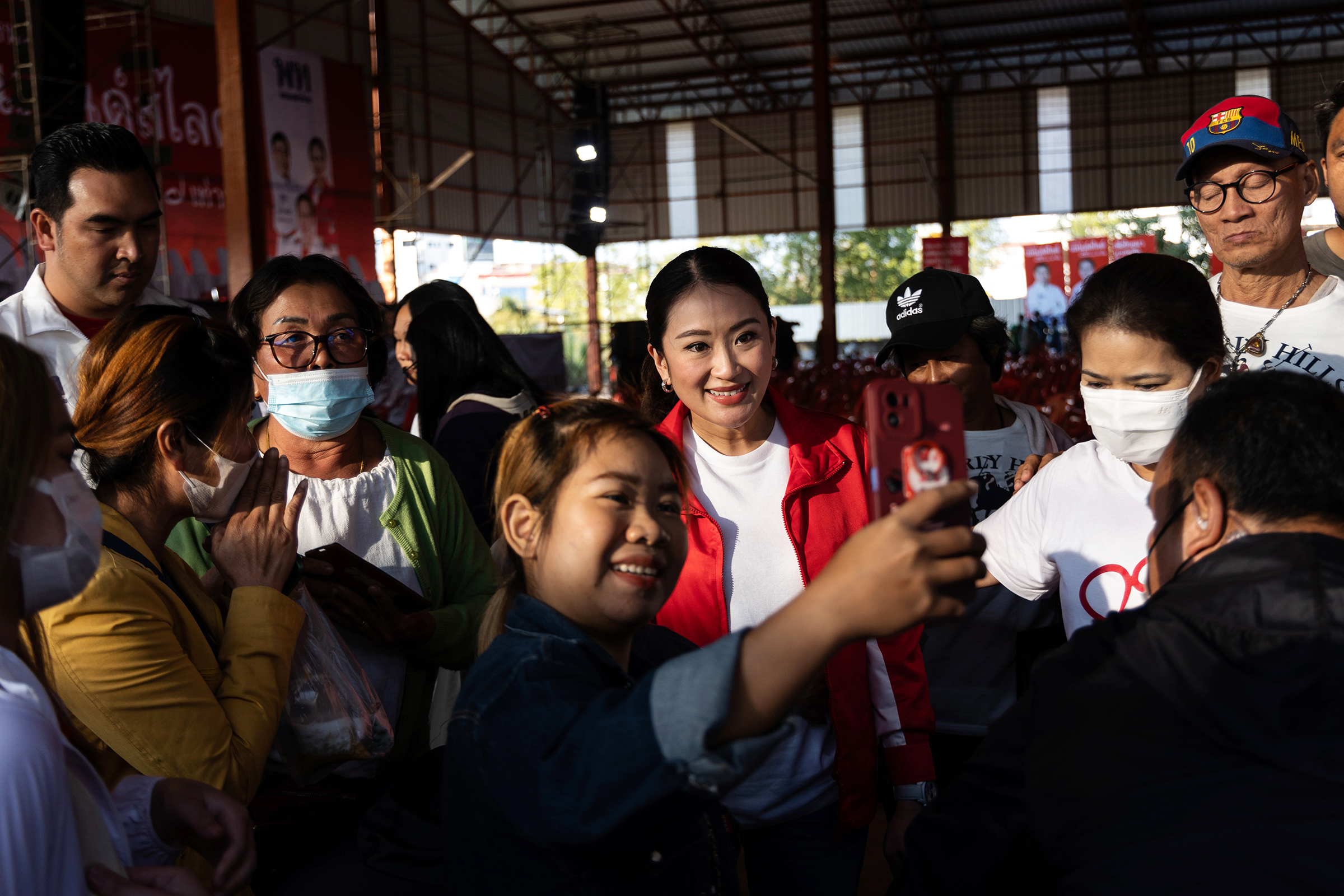
Paetongtarn is a politician for the social media age—she has over half-a-million followers on Instagram, compared to just 29,000 for the party she represents—but she also has ambitious ideas for revitalizing Southeast Asia’s second-biggest economy. Pheu Thai has vowed to almost double daily minimum wages by 2027, expanding health care coverage and subsidizing Bangkok’s public transportation. Paetongtarn has made bold pledges on installing high-speed rail and water storage infrastructure to protect farmers from a regular cycle of floods and droughts. While the party has backed reform to make Thailand’s legal system more accepting of the LGBTQ+ community, she has been vocally critical of the nation’s cannabis decriminalization, promising to rein in its recreational use.
It’s a populist mix of progressive and conservative policies designed to attract as many geographic and social cohorts as possible. “[Paetongtarn’s] family name carries a lot of weight,” says Aim Sinpeng, a senior lecturer at the University of Sydney. “But she has also tried to stand out and capture the more progressive youth voices that Pheu Thai has never really gotten.”
Paetongtarn’s campaign speech in Phichit—a small town known for farming lotus and pomelo—took place at what could be seen as the fulcrum of modern Thai politics. Just 80 miles south, the Nan river, which runs from Laos through Thailand’s northeastern Isaan region, meets the Chao Phraya river, which flows south through affluent Bangkok.
Pheu Thai’s heartland has traditionally been in Isaan, Thailand’s poor but populous rice-farming region. Thaksin was the first Thai politician to realize that charming Isaan’s reservoir of voters was the surest path to national electoral victory, and he set about wooing them with populist policies such as microfinance loans, subsidized higher education, and 30-baht ($1) health care.
But Thaksin’s fanatical following irked the Bangkok-based elite power nexus centered on the military, judiciary, and royal palace, which accused him of being a corrupt, vote-buying demagogue. To his northeastern supporters, he’s the only one who ever listened to their plight, and the repeated ousting of Thaksin-backed governments has stoked their burning sense of injustice. For the past 17 years, the peoples of the Nan and Chao Phraya rivers have been locked in bitter acrimony, which periodically manifests in deadly, color-coded street protests. (Thaksin supporters wear red; their royalist opponents don yellow.)
Under Paetongtarn’s leadership, however, Pheu Thai’s appeal has swelled beyond its Isaan heartland to draw in disaffected urban youth and even voters in Thailand’s deep south, which have never traditionally been fans of her father. It’s a symptom of the deep malaise that has gripped the self-styled Land of Smiles in recent years, with the pandemic devastating the vital tourism industry, and the global economic slowdown hitting exports. GDP growth is torpid.
“People can’t take it anymore,” says Paetongtarn. “These last eight years, people are getting into more debt, [getting addicted] to drugs, they kill one another. Everything is getting worse and worse.”
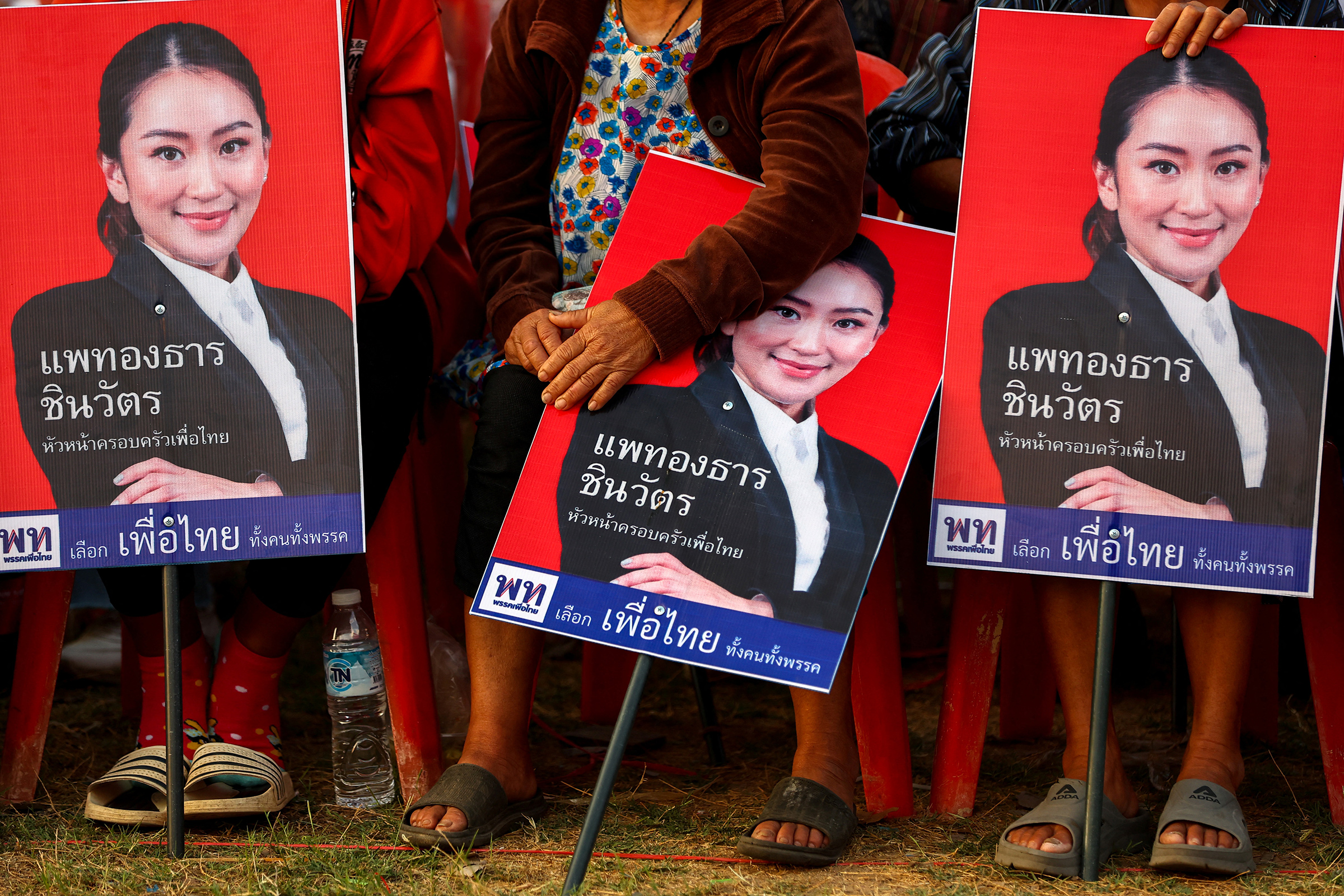
Paetongtarn grew up far away from the voters she now courts. Born in Bangkok, she attended elite schools before spending a year studying at the University of Surrey in the U.K. By her own admission, she was more interested in partying than hitting the books. “When it was time to study, I studied a lot,” she says. “When it wasn’t, I didn’t study at all!” Weekends were spent hosting dinners and card games with friends in London’s well-heeled Knightsbridge neighborhood, where her father keeps a home opposite the Harrods department store.
After graduation, Paetongtarn returned to Bangkok to take up a position in Rende Development, a family-run hospitality firm with a portfolio of hotels and golf courses. Serving as deputy to her CEO older sister, Pintongta, she personally oversaw the launch of two new luxury hotels, the Rosewood Bangkok and Thames Valley Khao Yai—although her bid for the nation’s highest office has naturally upended the family dynamic. “My sister now says, ‘I feel like I’m not your boss anymore!’” Paetongtarn says, with a laugh.
Family is everything to Paetongtarn, who says she spends any spare time engrossed in parenting and child psychology books, preparing for the impending arrival of her second child, a boy. “My dad is excited because he will look like him,” she says. Sure enough, her smartphone background is a photo of her fugitive father with his 2-year-old granddaughter, Titarn.
“I’m very close with my dad,” she says. “I’ve always been daddy’s little girl. So I consult with him about almost everything, like love life when I was younger, and study. So right now, of course, I talk to him about politics from time to time. He’s only worried that I’m pregnant and he doesn’t want me to stress out too much.”
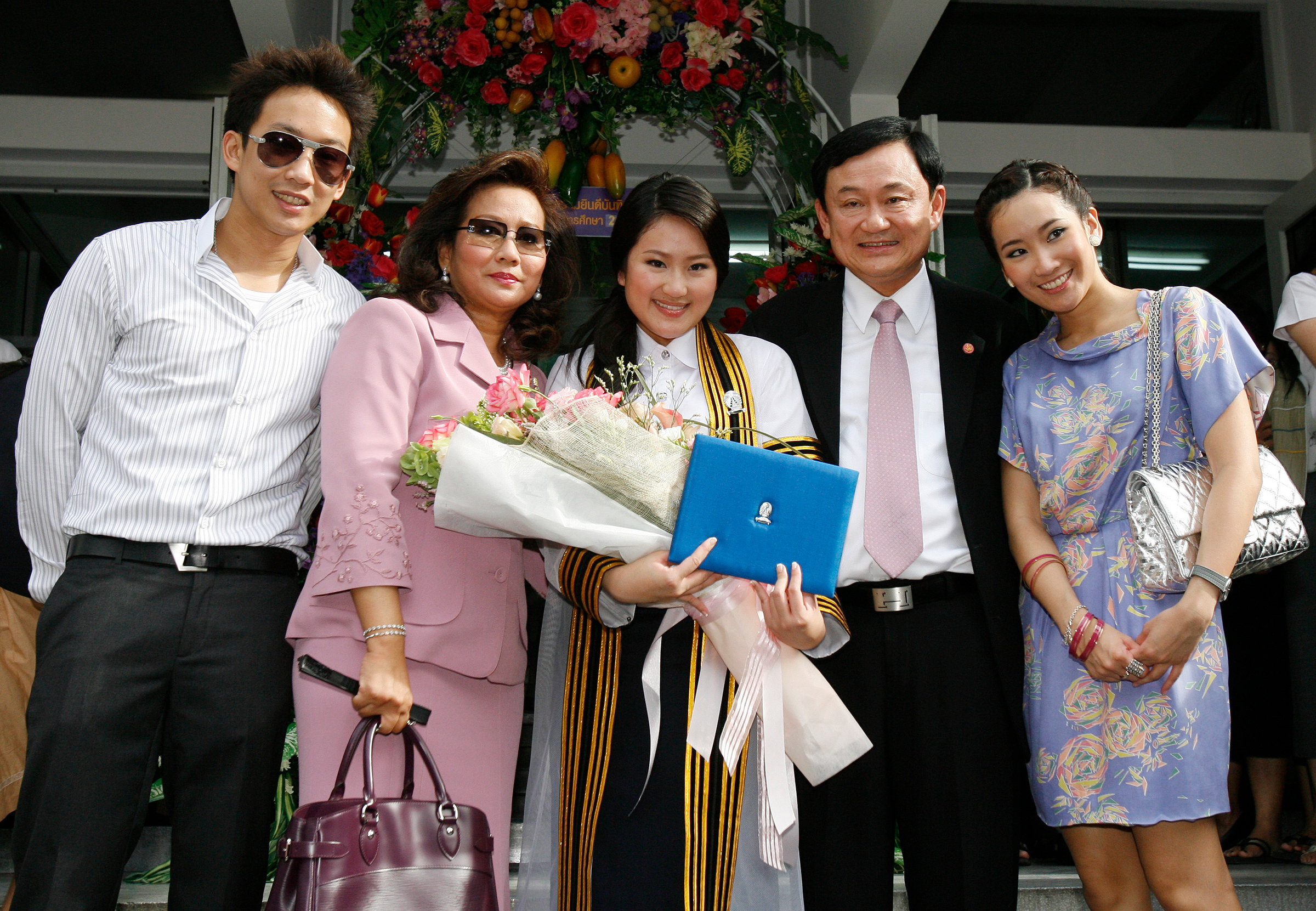
Thaksin’s role in May’s election, however, goes beyond that of doting grandfather. Much of Pheu Thai’s appeal is rooted in nostalgia for more prosperous times when he was in power. Twenty years ago, Thailand was emerging from the Asian financial crisis with gusto, and was increasingly recognized as a confident middle power. “A lot of people still remember that time,” says Thitinan. “But since then, we’ve been up and down, and out-competed by Vietnam, Indonesia, and so on.”
Yet Thaksin’s stint wasn’t without controversy. His 2003 “war on drugs” involved some 2,800 extrajudicial killings, while his crackdown on Thailand’s southern Islamic insurgency was just as uncompromising. In 2004, 78 young Muslim men died of suffocation while under arrest in a cramped military vehicle in what became infamous as the Tak Bai incident. Allegations of corruption followed Thaksin everywhere. While Paetongtarn insists that the charges against her father and aunt were only initiated after their respective ousters and thus “aren’t fair,” she says innovations like blockchain can help any future Pheu Thai administration steer clear of graft allegations. “Technology can help make everything transparent,” she says.
How much influence Thaksin still wields over Pheu Thai remains controversial. Thaksin gives regular broadcasts to supporters on the Clubhouse app and has repeatedly claimed to be preparing to return to Thailand immediately after the May election, even if that means serving jail time. “When I go outside of Bangkok, I meet a lot of people who say, ‘We miss your dad and your aunt, bring them home,’” says Paetongtarn.
But it’s an incendiary proposition given that the 2014 coup that ousted Yingluck was spurred by mass protests against an amnesty bill that would have allowed Thaksin to return home a free man and reunited him with some $1.2 billion in seized cash and assets. Paetongtarn insists that she is not simply a stooge for her father to engineer his self-serving return.
“[My dad] has said that he is not going to do anything with the party or me just to bring him back,” she says. “I trust him with that, and I believe that he has his own plans.”
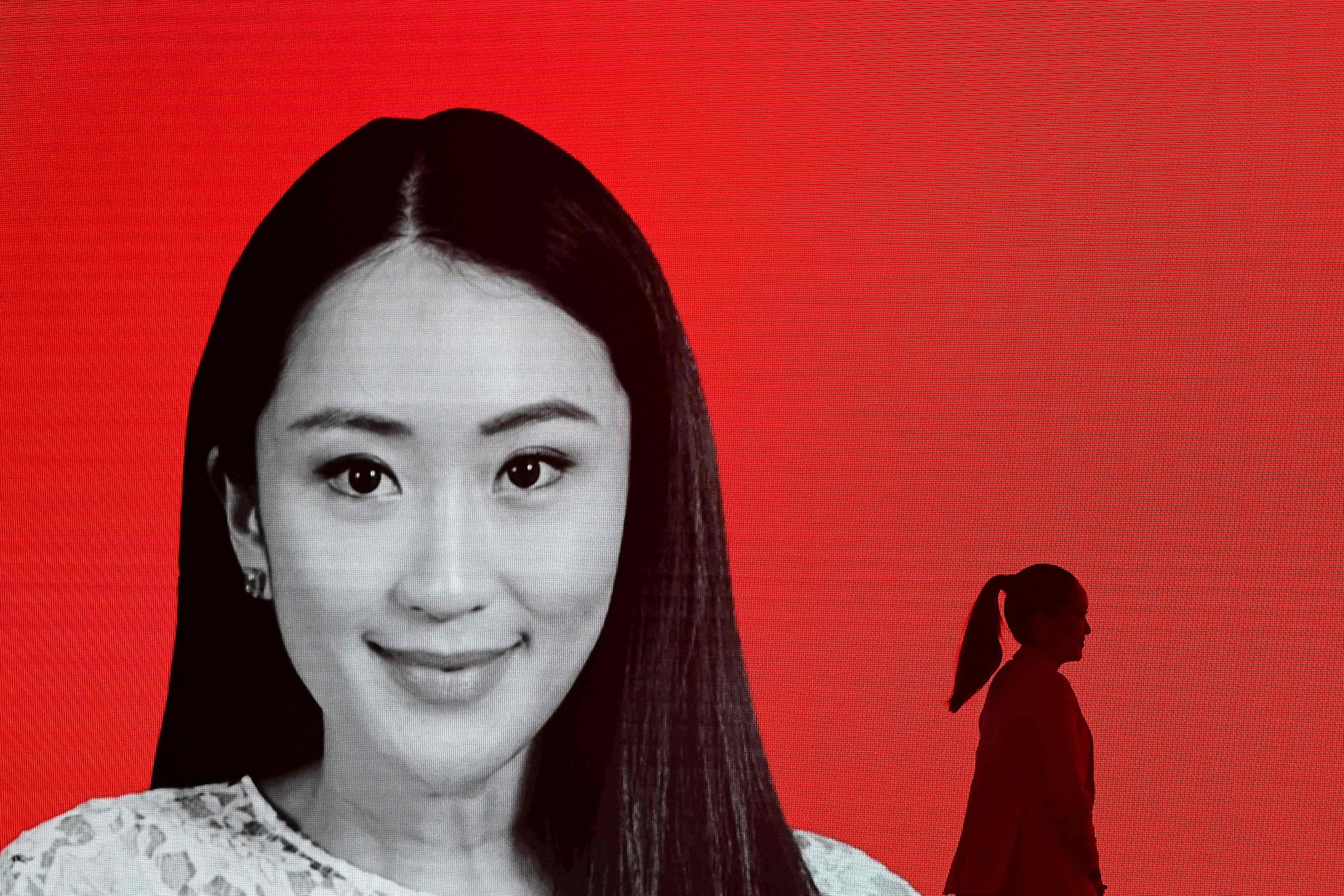
Another hot button issue Paetongtarn has to contend with, especially as she courts young Thais, is the role of Thailand’s monarchy. Thailand’s King Maha Vajiralongkorn lacks the popularity of his esteemed father, in large part due to his unconventional lifestyle. Since ascending the throne in 2016, the four-times married 70-year-old who prefers to live overseas has brought two key army regiments under his command and taken direct oversight of royal assets estimated at some $33 billion. Vajiralongkorn is protected by the world’s strictest royal defamation law—known as lèse-majesté, or Article 112—which carry penalties of up to 15 years imprisonment and which activists say has been increasingly used to crush dissent. Since November 2020, more than 200 people have been charged with Article 112 for activities related to pro-democracy rallies or comments on social media.
In recent years, increasing numbers of the younger generation have taken to the street to demand the palace stop meddling in the democratic process. The upstart Future Forward Party won 17% of the vote in 2019 by campaigning on this platform. Although Future Forward has since been banned, its successor Move Forward Party is projected to do even better this time around. Paetongtarn says that Article 112 “is a problem” since lèse-majesté charges—which can be levied by any individual, rather than a judicial body—are often “being used by politicians to discredit one another. It’s not even about the palace.”
But it’s an incredibly sensitive issue. Reforming Article 112 is a goal that few other mainstream Thai parties share, meaning Pheu Thai might be forced into a risky alliance with Move Forward, which could prove a red line for the Thai establishment.
“Both parties in the same government will be radioactive to a lot of conservatives in Thailand,” says Napon Jatusripitak, a visiting fellow at the ISEAS-Yusof Ishak Institute in Singapore. “A coup against a coalition of Pheu Thai and Move Forward is definitely a possibility.”
Paetongtarn knows she will have to tread very carefully. At the very least, the stage is set for a lot of horse-trading when the results come in. By then, Paetongtarn will have at least one more life to care for—and possibly, she hopes, 70 million others close behind.
“I am ready for this,” she says, steely eyed. “I’m ready to fight, I’m ready to make the country a better place for my children.”
More Must-Reads from TIME
- Cybersecurity Experts Are Sounding the Alarm on DOGE
- Meet the 2025 Women of the Year
- The Harsh Truth About Disability Inclusion
- Why Do More Young Adults Have Cancer?
- Colman Domingo Leads With Radical Love
- How to Get Better at Doing Things Alone
- Michelle Zauner Stares Down the Darkness
Write to Charlie Campbell / Bangkok at charlie.campbell@time.com
